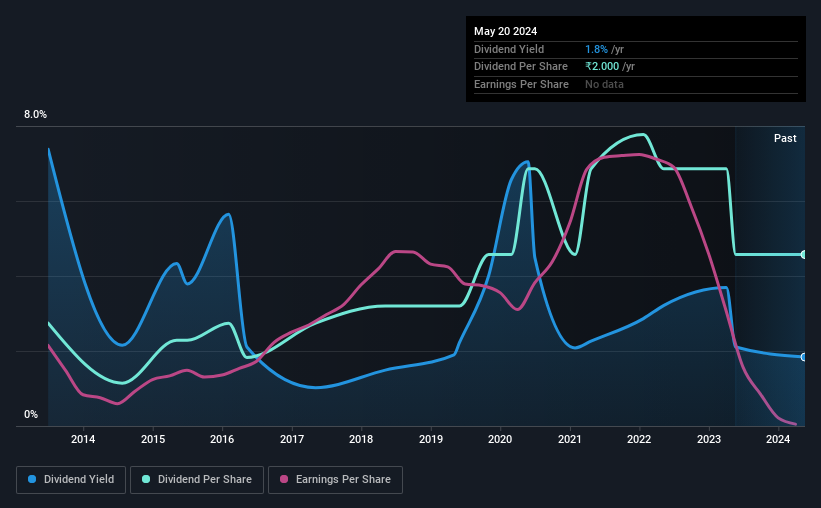- India
- /
- Basic Materials
- /
- NSEI:VISAKAIND
Visaka Industries' (NSE:VISAKAIND) Dividend Is Being Reduced To ₹0.50

Visaka Industries Limited (NSE:VISAKAIND) has announced that on 14th of August, it will be paying a dividend of₹0.50, which a reduction from last year's comparable dividend. However, the dividend yield of 1.8% is still a decent boost to shareholder returns.
View our latest analysis for Visaka Industries
Visaka Industries Is Paying Out More Than It Is Earning
While it is great to have a strong dividend yield, we should also consider whether the payment is sustainable. Based on the last payment, earnings were actually smaller than the dividend, and the company was actually spending more cash than it was making. This high of a dividend payment could start to put pressure on the balance sheet in the future.
If the company can't turn things around, EPS could fall by 58.9% over the next year. Assuming the dividend continues along recent trends, we believe the payout ratio could reach 1,375%, which could put the dividend under pressure if earnings don't start to improve.

Dividend Volatility
While the company has been paying a dividend for a long time, it has cut the dividend at least once in the last 10 years. Since 2014, the annual payment back then was ₹1.20, compared to the most recent full-year payment of ₹2.00. This works out to be a compound annual growth rate (CAGR) of approximately 5.2% a year over that time. It's good to see the dividend growing at a decent rate, but the dividend has been cut at least once in the past. Visaka Industries might have put its house in order since then, but we remain cautious.
The Dividend Has Limited Growth Potential
With a relatively unstable dividend, it's even more important to see if earnings per share is growing. Visaka Industries' earnings per share has shrunk at 59% a year over the past five years. This steep decline can indicate that the business is going through a tough time, which could constrain its ability to pay a larger dividend each year in the future.
We're Not Big Fans Of Visaka Industries' Dividend
To sum up, we don't like when dividends are cut, but in this case the dividend may have been too high to begin with. The company isn't making enough to be paying as much as it is, and the other factors don't look particularly promising either. The dividend doesn't inspire confidence that it will provide solid income in the future.
Investors generally tend to favour companies with a consistent, stable dividend policy as opposed to those operating an irregular one. However, there are other things to consider for investors when analysing stock performance. Just as an example, we've come across 4 warning signs for Visaka Industries you should be aware of, and 3 of them are concerning. If you are a dividend investor, you might also want to look at our curated list of high yield dividend stocks.
If you're looking to trade Visaka Industries, open an account with the lowest-cost platform trusted by professionals, Interactive Brokers.
With clients in over 200 countries and territories, and access to 160 markets, IBKR lets you trade stocks, options, futures, forex, bonds and funds from a single integrated account.
Enjoy no hidden fees, no account minimums, and FX conversion rates as low as 0.03%, far better than what most brokers offer.
Sponsored ContentNew: Manage All Your Stock Portfolios in One Place
We've created the ultimate portfolio companion for stock investors, and it's free.
• Connect an unlimited number of Portfolios and see your total in one currency
• Be alerted to new Warning Signs or Risks via email or mobile
• Track the Fair Value of your stocks
Have feedback on this article? Concerned about the content? Get in touch with us directly. Alternatively, email editorial-team (at) simplywallst.com.
This article by Simply Wall St is general in nature. We provide commentary based on historical data and analyst forecasts only using an unbiased methodology and our articles are not intended to be financial advice. It does not constitute a recommendation to buy or sell any stock, and does not take account of your objectives, or your financial situation. We aim to bring you long-term focused analysis driven by fundamental data. Note that our analysis may not factor in the latest price-sensitive company announcements or qualitative material. Simply Wall St has no position in any stocks mentioned.
About NSEI:VISAKAIND
Visaka Industries
Manufactures and sells corrugated cement fiber sheets in India and internationally.
Slight and slightly overvalued.
Market Insights
Community Narratives



